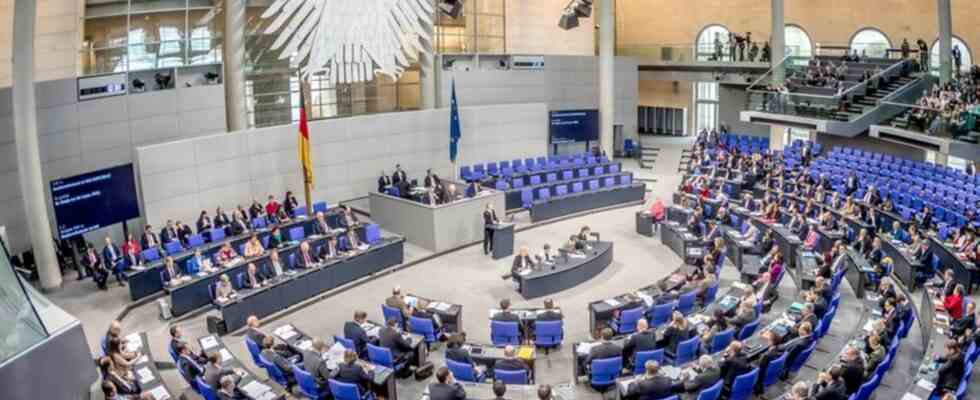Bundestag
Traffic light factions want quick electoral law reform – CSU rages
The plenary hall during a session of the German Bundestag. photo
© Michael Kappeler/dpa
With the electoral law reform proposed by the SPD, Greens and FDP, the Bundestag is to shrink to its standard size. The CSU sees the proposal as a blow to the democratic foundation.
The traffic light factions are pushing for a quick decision on their bill for an electoral reform, which would reduce the Bundestag back to its standard size of 598 MPs. This opens up the possibility of using the new system in the next federal election, said Till Steffen (Greens) in Berlin. There will probably be an expert hearing in the Bundestag on the draft as early as February.
The traffic light politicians’ proposal also provides for the terms “first vote” and “second vote” to be replaced by the terms “constituency vote” and “main vote”. This is more understandable for the voters, who often do not understand which vote is for the direct candidate and which for the party, said Steffen.
Due to overhang and compensation mandates, the parliament has continued to grow in recent years – to 736 MPs most recently. The draft law by the SPD, Greens and FDP now provides that there should be no more overhang and compensation mandates in the future. As a result, MPs directly elected in a constituency may not get a seat in the Bundestag.
CSU: “We only know this from rogue states”
Resistance to the proposal comes primarily from the CSU. “We only know from rogue states that directly elected members of parliament are refused entry into parliament,” said CSU General Secretary Martin Huber. “The left-yellow traffic light lays the ax on our democratic foundation.” Konstantin Kuhle (FDP) held against it. He emphasized that the planned electoral law reform would affect all parties equally and was “not a reform at the expense of the CSU”.
The parliamentary director of the SPD parliamentary group, Katja Mast, said: “CSU and CDU do not have their own draft law – that would be the first step before wild combative rhetoric.” The Union also has no proposal that would make the Bundestag permanently smaller. The traffic light’s proposal for an easy-to-understand electoral law is “fair and leads to stable conditions – that’s why we invite the Union to talk to us about it”.
The left also sees problems
But the left also has reservations about the draft of the traffic light coalition. Party leader Janine Wissler said it was necessary to examine this more closely. However, if directly elected candidates from individual constituencies do not get into the Bundestag, there is a risk that entire regions will no longer be represented in Parliament. She considers that to be “rather problematic”.
In the past legislative period, the Greens, FDP and Left Party had presented a joint bill for a reform, but were unable to get it through. Union and SPD finally agreed on a reform with very limited effect. “We examined many possibilities and variants and then agreed not to make a small reform or an intermediate step, as was the case in the past electoral periods, but to tackle the system in principle and make a fundamental reform of the electoral law,” said Sebastian Hartmann (SPD).
The taxpayers’ association criticizes the costs of the bloated Bundestag
The taxpayers’ association (BdSt) supported the initiative. “After all, a long-overdue reform of the electoral law has been delayed for too many years,” said BdSt President Reiner Holznagel. The bloated Bundestag causes considerable additional costs. A “parliamentary added value” through the higher number of MPs is not recognizable.
A few days ago, the commission responsible for the division of constituencies presented a recommendation for a reduction from 299 to 280 constituencies. According to this, constituencies should be dissolved in all federal states with the exception of Bremen, Hamburg, Mecklenburg-Western Pomerania and Thuringia and others adjusted accordingly. Should the reform now proposed by the traffic light groups be adopted, it would be obsolete.
Because according to the draft law, the previous division into 299 constituencies and two votes that each voter can cast would remain. In the future, only the second votes, which were then called “main votes”, should be decisive for the distribution of seats in the Bundestag.

